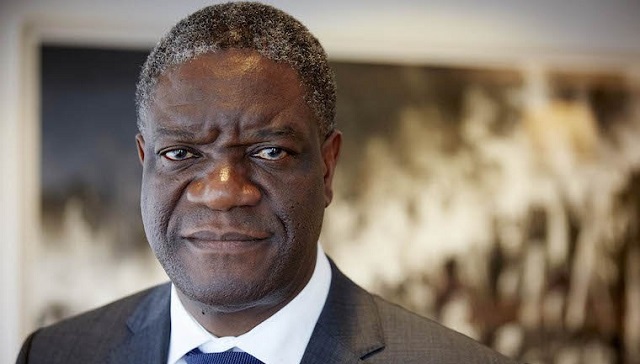
Bukavu, DR Congo | AFP | Thousands of people in DR Congo turned out to welcome Nobel Peace Prize laureate Denis Mukwege, the surgeon who helps women recover from the trauma of rape.
“We won! We won!” sang Mamy Magasine as she improvised a celebratory rumba in a rain-soaked courtyard in Bukavu, in the eastern province of South Kivu on the border with Rwanda.
“He is the pride of Congolese women, and even women of the whole world,” said Magasine, the local head of the country’s ministry for families.
A little earlier, Mukwege arrived on a UN flight and was driven into the city with an escort of UN peacekeepers.
Mukwege’s Panzi hospital has treated tens of thousands of victims of sexual violence in his war-weary native province of South Kivu.
But since an attempt on his life in October 2012, he lives inside the hospital compound under the protection of UN peacekeepers.
Wearing a scarf bearing the national colours, he arrived to a rapturous reception from the crowd, composed mainly of women, in front of a local college.
“We will build a a more beautiful country than before, with peace,” he said.
Mukwege showed the crowd his Nobel prize and said the $400,000 prize money that came with it would be ploughed back into treating the women under his care.
“This is a beautiful day for me, this prize is your prize, protect it! Let’s build a lasting peace,” he added, to applause.
Speaking mainly in Swahili but passing sometimes into French, Mukwege also called for the creation of a compensation fund for victims of sexual violence and urged UN member states to contribute.
– ‘It’s him, our president‘ –
“Why not a special tribunal for the Congo?” he added, referring to past examples of the International Criminal Tribunal for the former Yugoslavia (ICTY) and the International Criminal Tribunal for Rwanda (ICTR).
He drew more applause after calling for a state of law, adding: “A country without violence, it’s a bit difficult, but it’s not impossible.”
Muwkege arrived a day after the country’s election panel announced yet another delay to presidential, legislative and municipal elections in troubled parts of the country, provoking violent protests.
He noted that no local politicians had turned out for this event, said the electoral process appeared to have stalled, and called for the Constitution to be respected.
In a recent opinion piece for the New York Times, Muwkege urged Kabila to give up power, but he did not go that far in Thursday’s speech.
He did urge all those in power to “measure the gravity of the situation to avoid chaos”.
“We’re sick of it,” he added, to the delight of the crowd.
President Joseph Kabila has been in power in 2001, since the assassination of his father, Laurent-Desire Kabila.
He was to step down at the end of 2016 after two terms in office. But instead he stayed on, invoking a clause in the constitution that enables a president to stay in office until a successor is elected.
“It’s him, our president, because he speaks of peace,” said one young member of the audience after Muwege’s speech.
Mukwege shared this year’s Nobel Prize with Nadia Murad, the Iraqi Yazidi woman campaigning for people after herself surviving as a hostage of Islamic State jihadists.
 The Independent Uganda: You get the Truth we Pay the Price
The Independent Uganda: You get the Truth we Pay the Price



